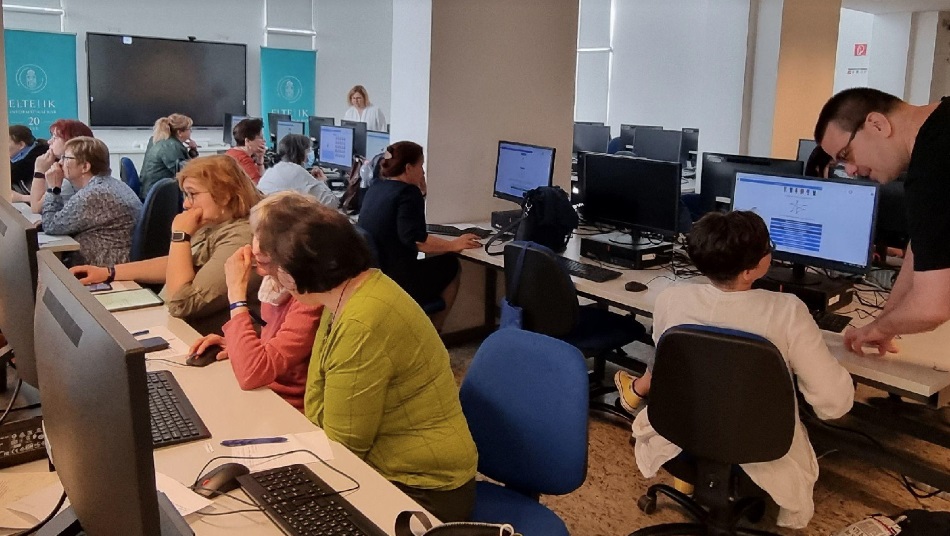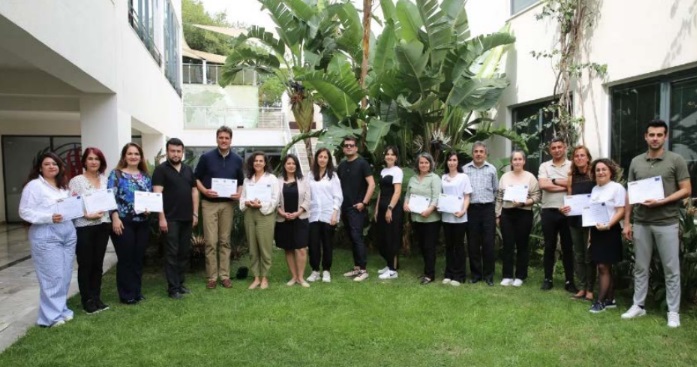
Erasmus+ KA220 project “Computational Thinking and Mathematical problem solving, an Analytics based learning environment” or in abbreviated form, CT&MathABLE, enhances European educational resilience and capacity leveraging digital transformation tools and pedagogies to realise innovative school curricula to enable recognition and validation of skills and qualifications addressing future demands for citizens with the digital skills and computational literacy needed for digital transformation. The project delivers open, relevant and localized educational resources for developing Computational Thinking and Algebraic Thinking of primary and lower secondary school students with novel modes of interaction and high quality content.
CT&MathABLE delivers:
- personalized learning trajectories (Learning Paths) in developing competencies of Computational Thinking and Algebraic Thinking combining a learning architecture and cutting edge learning analytics technologies with interactive tasks that have been proven to engage learners in accelerated intellectual development;
- competency frameworks for integrated and automated assessment of learning in Informatics (Computer Science) and Mathematics;
- large scale libraries of interactive tasks designed explicitly to hone Computational Thinking and Algebraic Thinking skills.
About CT&MathABLE project
There is increasing European concern over worsening student performance, in particular concern over PISA study outcomes, and the supply of engineering and scientific competence to fuel industrial competitiveness. The countries involved in this application have also been concerned over the supply of digital and engineering competence for some time. To address the situation several proposals have been made, including DigCompEdu 2.0, establishing digital targets for Europe 2030 (https://commission.europa.eu/strategy-and-policy/priorities-2019-2024/europe-fit-digital-age/europes-digital-decade-digital-targets-2030_en) and establishing guidelines for education in future https://education.ec.europa.eu/focus-topics/digital/education-action-plan).
Making careers requiring mathematical and computing profiles in compulsory schooling more accessible and attractive to young people is a key element to enhancing access to STEM careers. Teachers, however, report low levels of preparedness, and need for additional support to implement these ambitious
programmes. See the report “Digital Competence, Teacher Self-Efficacy and Training Needs” (Mannila et al., 2018, DOI:10.1145/3230977.3230993), for a discussion of the status and needs of the teaching profession. Leveraging digital transformative technologies CT&MathABLE project provides teachers with new approaches to developing
Algebraic Thinking (AT) and Computational Thinking (CT) competencies in a way that is individually tailored to the learner. CT&MathABLE is going to achieve this through a novel architecture which supports individualized development paths and seamless
integration with competency and assessment frameworks. This approach builds on the previous joint work of partners VU, KTH, and UTU in the current consortium.
CT&MathABLE is about creating learning approaches more appropriate to those who are traditionally disadvantaged and helping them to benefit from CT and AT and thus STEM careers, contributing to a stronger and more egalitarian society. In addition the outcome strengthens the partners national capacity in terms of highly qualified STEM citizens who will contribute to technical development and sustainability as well as broadened participation and inclusion.
The project delivers new tools to teachers, teacher educators, education providers and individual schools, and contributes to the goal of achieving sustainable quality in education. CT&MathABLE combines a unique learning resources and learning analytics with expertise from leading research groups developing curricula and resources to support teaching CT and AT in all age groups. Drawing on our prior track record in
competency frameworks for the computing curriculum and innovative pedagogy we are uniquely positioned to develop a learning and assessment architecture which combines learning analytics and competency frameworks to support individualised learning trajectories for a CT and Maths Able society.
Objectives of the project
CT&MathABLE makes specific contributions to empowering citizen agency in STEM, with the objective of strengthening sustainable competitiveness, ensuring social fairness, facilitating access to education. While doing so, the partnership we have forged also addresses other overarching EU actions, such as the European Digital
Strategy, the Industrial and Small and Medium Enterprise Strategy, the Recovery Plan for Europe, and increased support for youth employment. In particular with a focus on technical and engineering pathways and competitiveness. These elements should be addressed in particular through the intensified activities to develop problem solving, algebraic and computational thinking skills and competencies, to develop collaborative educational programmes across the project partner countries, and engage with local educational systems and education providers.
CT&MathABLE main objective is to support digital transformation of students in multiple dimensions:
1) Improve school students digital skills and self-awareness based on learning-analytics;
2) Enhance computational thinking (CT) and algebraic thinking (AT) through the interactive tasks;
3) Integrate the STEM approach for task-based learning;
4) Create instruments for CT Assessment with learning-analytics, and
5) Provide the interactive tasks and assessment instruments in a format that can be integrated with various learning management systems.
The project aims to provide a learning-analytics based framework to support individualized learning trajectories for students in ages 9-14 across Europe. In this way, all children in ages 9-14 will be able to strengthen their Computational and Algebraic Thinking skills, which are among the key competencies of the 21st century, with Computer Science and problem solving tasks.
The project also has specific objectives in terms of teachers, instructional designers and school curricula. One of them is through the implementation of the CT&MathABLE system, teachers will experience the integration of technology into classroom settings as well as observe the effect of personalized instruction accompanied with the formal curricula. This implementation process is expected to work in a blended learning approach which again will make teachers to think and adopt appropriate pedagogical strategies for the use of interactive tasks through collaborative learning.
Innovative aspects of the project
CT&MathABLE develops innovative educational approaches to classroom education and supports transdisciplinary and holistic learning. The partners promote a pragmatic approach to Computational Thinking integrated with Algebraic Thinking (Mathematics) as to a set of tools, techniques and approaches which enable a seamless transition from the early-aged learners unplugged activities to digital-based learning paths.
CT&MathABLE develops an innovative personalized digital learning trajectories. The resulting personalized learning architecture integrates digital transformation of learning process and assessment frameworks. Through CT&MathABLE school students in Europe will have access to new teaching and learning support enhancing learning outcomes in CT integrated with AT for learners of ages 9 to 14 and directly influencing key performance indicators such as national test results and PISA rankings.
The key innovations are:
- integration CT with AT;
- individual learning paths and assessment framework for interactive problem-based educational architecture, which increases student motivation via any gamified learning environment;
- linking competence frameworks with automated assessment so that learning analytics data will be interpreted using relevant learning theories;
- new approaches to empowering less motivated learners to succeed in the 21st century key skills by strengthening student self-awareness through the usage of learning analytics.
Problem solving skills development are based on evidence-based guidance system. Using student-cantered approach in an online environment, that aims students to overcome the weaknesses and misunderstandings leading to improve student key
competencies by solving interactive tasks based on CT with integration of AT, is another innovation of this project.
CT&MathABLE project is unique in terms of the creation of learning trajectories on CT integrated with AT which would lead to achieving personal outcomes of each learner.
Meetings
Kick-of meeting in Bilbao, 26-28 October, 2022
Overview of the project goals and special objectives, discussion and clarification of the target groups: teacher trainers, policy makers and politicians, presented by the project coordinator professor Valentina Dagienė, Vilnius University. Introductions by project partner institutions: Basque Country University, Vilnius University, Eötvös Loránd University, Turku University, KTH Royal Institute of Technology, Ankara University, Mamak Özkent Akbilek School, Türkiye, and Klaipėdos Gedminų Progymnasium, Lithuania.
Discussion about involving different disciplines teachers. D during the project activities, the main fucus should be on mathematics and informatics (computing, information technology) teachers but others like science or technology teachers could get involved at some point of projects, for example in piloting activities.
Partners have provided brainstorming on developing Learning Paths, many ideas were collected, overviewed and going to be implemented in work package 2 especially.
Intensive work was dedicated to revise the project reviewers recommendations, the assessment. All partners made comments on the project assessment sheet.
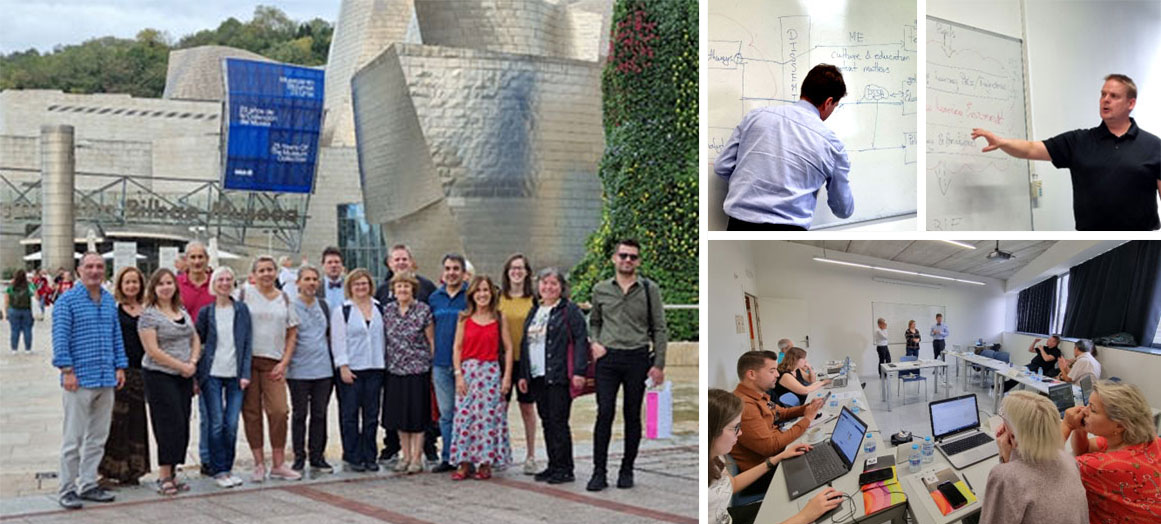
Meeting in Budapest 30-31 May - 1 June 2023
The 7th project CT&MathABLE meeting was held face-to-face from 30-31 May to 1 June 2023 at Eötvös Loránd University, Faculty of Informatics, Budapest. Twenty-two participants attended from all project partner institutions. Main attention was paid to define the Learning Paths and the curriculum analyses of Algebraic Thinking (WP2), development of the COMATH assessment instruments (WP3), and the framework of the interactive tasks (WP4). The meeting was culminated in a successful Hungarian teachers' workshop with focus on unplugged activities of Computational Thinking. Some unplugged ideas are shown in the presented photos.
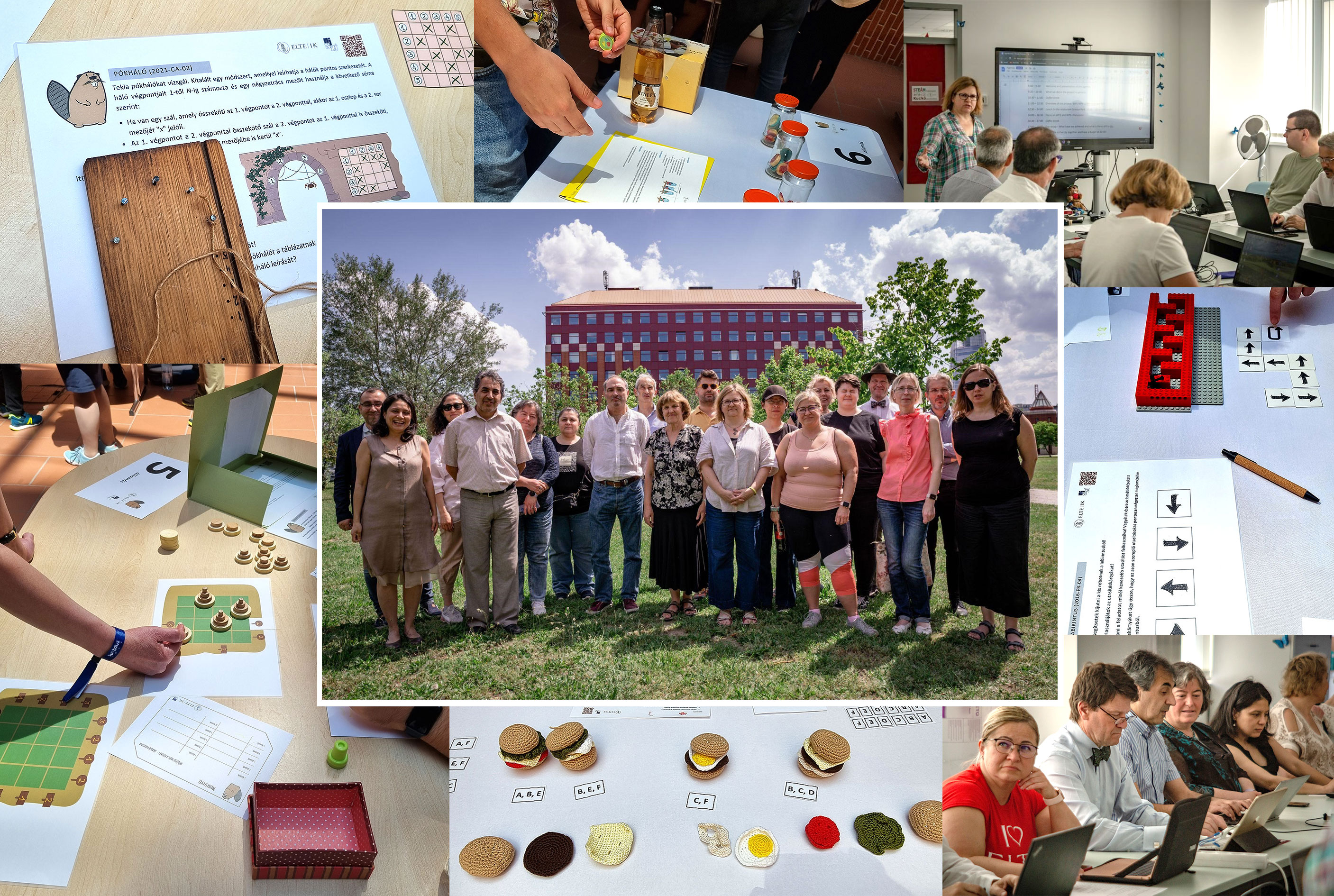
Meeting in Bodrum/Mugla April 22-24, 2024
During the first three days, partners discussed activities for developing computational thinking, created learning pathways for educational informatics concepts based on students’ age, and discussed assessment tools for algebraic and computational thinking development. All partners completed testing the prepared tools COMATH1, COMATH2, and COMATH3, which are integrated into ViLLE – a visual learning environment that is easy for students to use and convenient for researchers to analyze collected data. They discussed how to analyze the results, which statistical methods are more suitable, where and when to prepare scientific publications, and so on. Over 100 interactive tasks from various fields of informatics were presented and discussed.
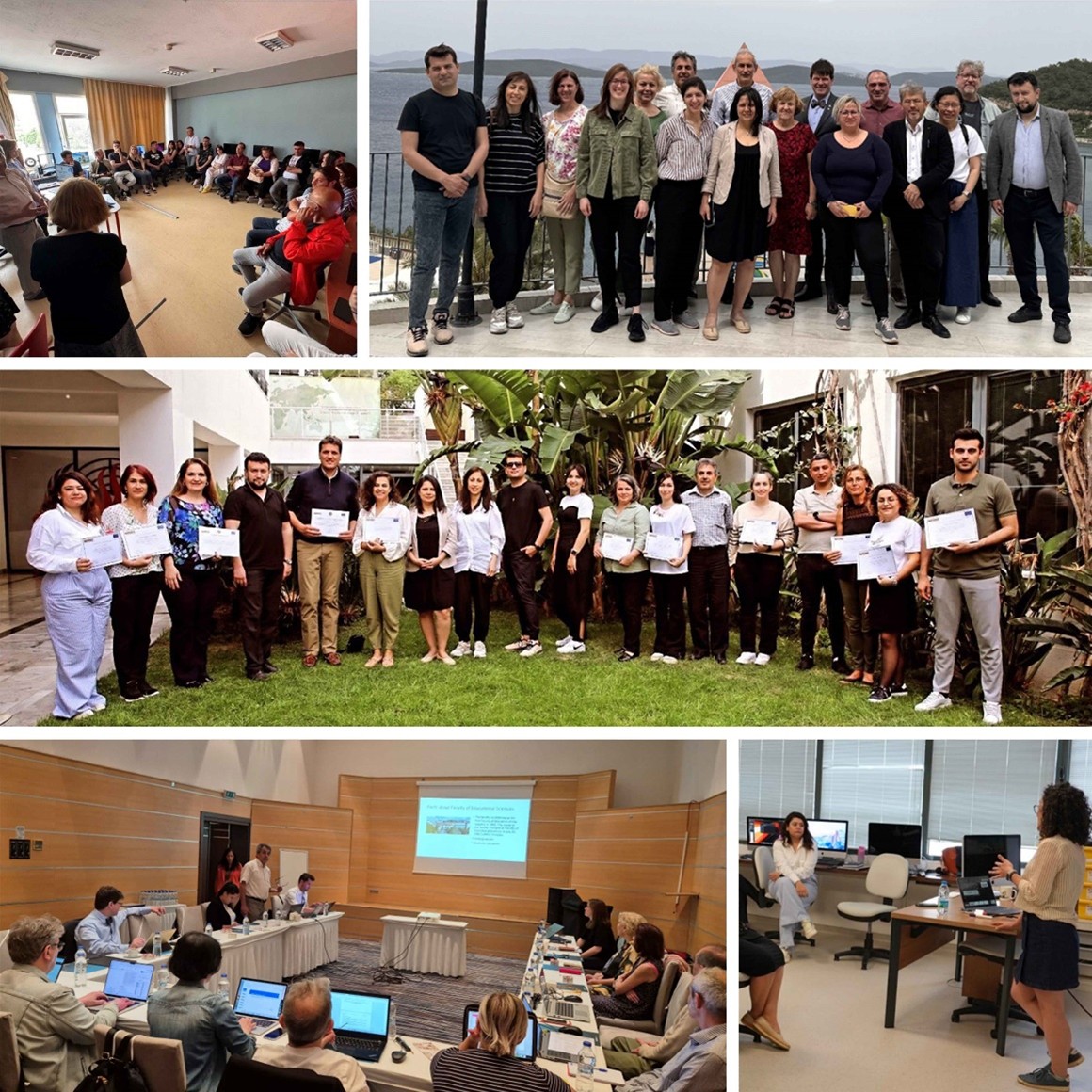
Meeting in Klaipėda, September 28 – October 2, 2004
The project partners had the opportunity to observe lessons at Klaipėda Gedminai Progymnasium, where both primary and secondary school students engaged with the interactive tasks developed for the project. The enthusiasm among the pupils was evident as they worked through a variety of challenges. Students showed particular interest in tasks like Venn diagrams, logical puzzles, and those requiring strategic planning. These tasks not only captured their attention but also encouraged them to think critically and apply computational thinking skills in a hands-on, practical way.

Meetings (online)
Online meetings – in the first week of each month
Regular monthly online meetings are organised in the first week of each month or as required.
In the first week of each month or as required, the partners meet to discuss the project's progress, main activities, and results. Agreements on what should be done further are discussed and confirmed.

7 December, 2022

10 January, 2023

8 February, 2023

7 March, 2023

4 April, 2023

2 May, 2023

27 June, 2023

22 August, 2023

19 September, 2023

16 October, 2023

14 November, 2023

12 December, 2023

9 January, 2024

20 February, 2024

12 March, 2024
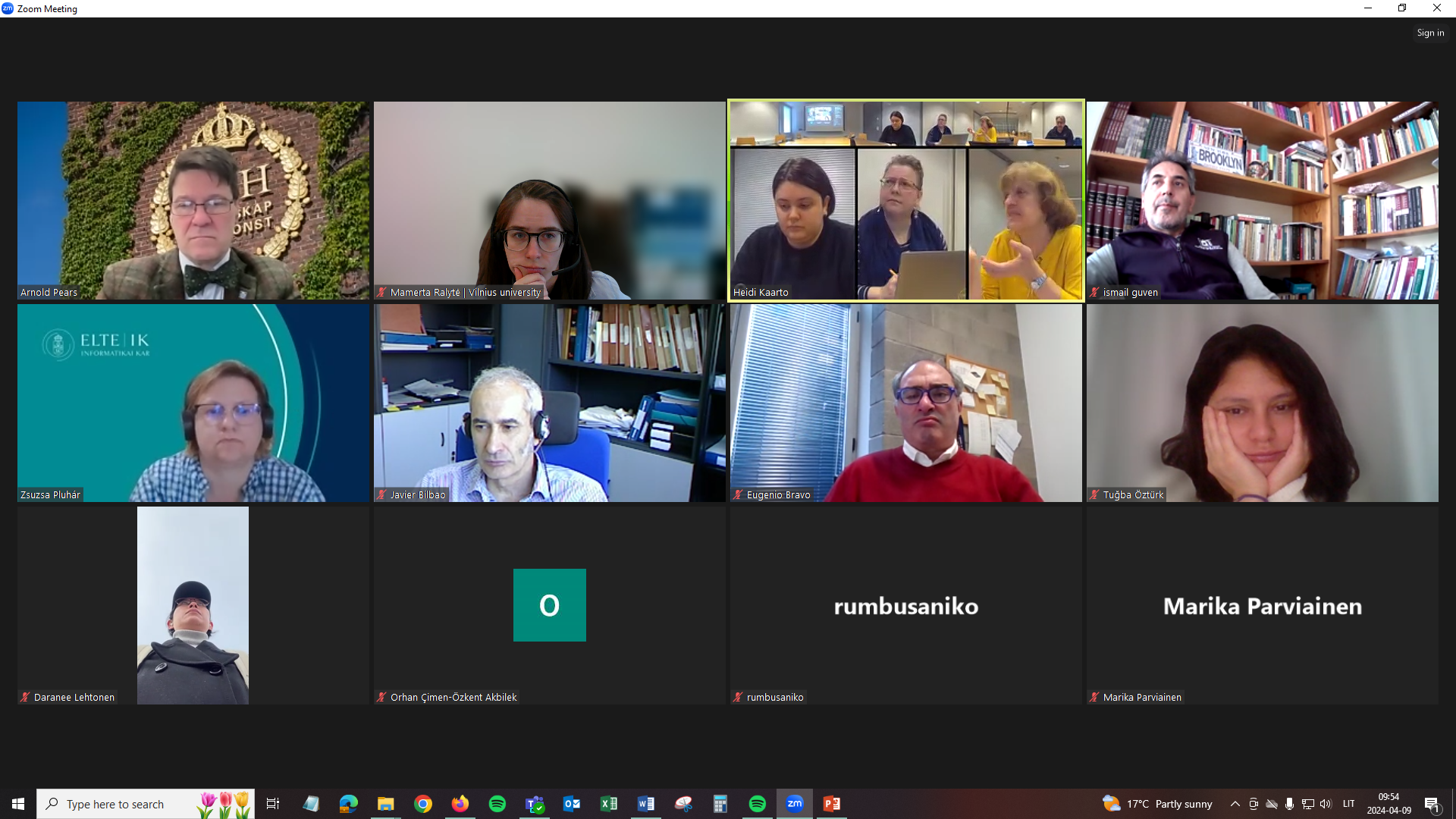
9 April, 2024
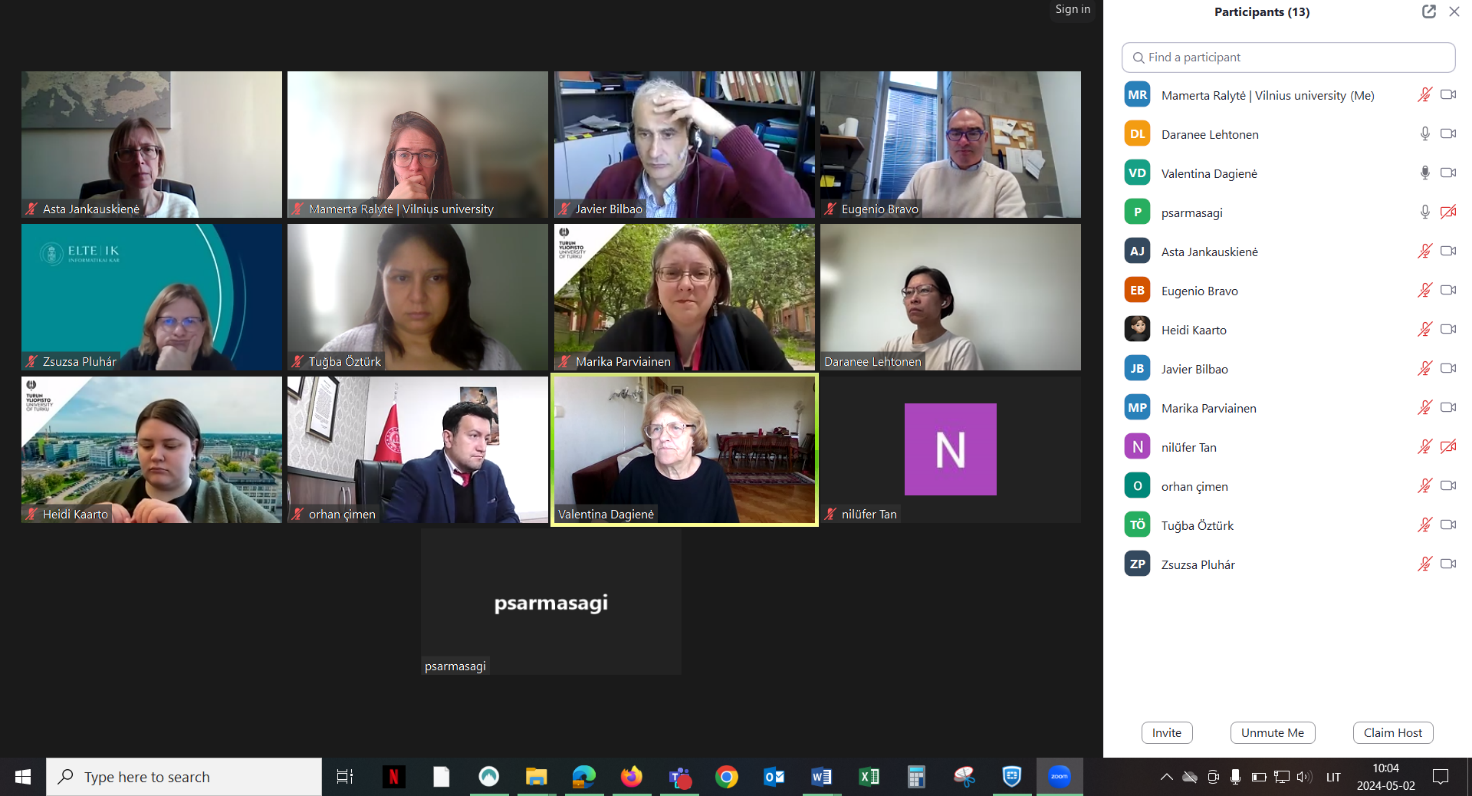
2 May, 2024
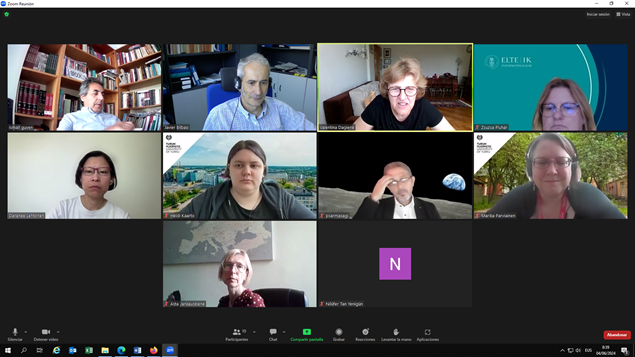
4 June, 2024
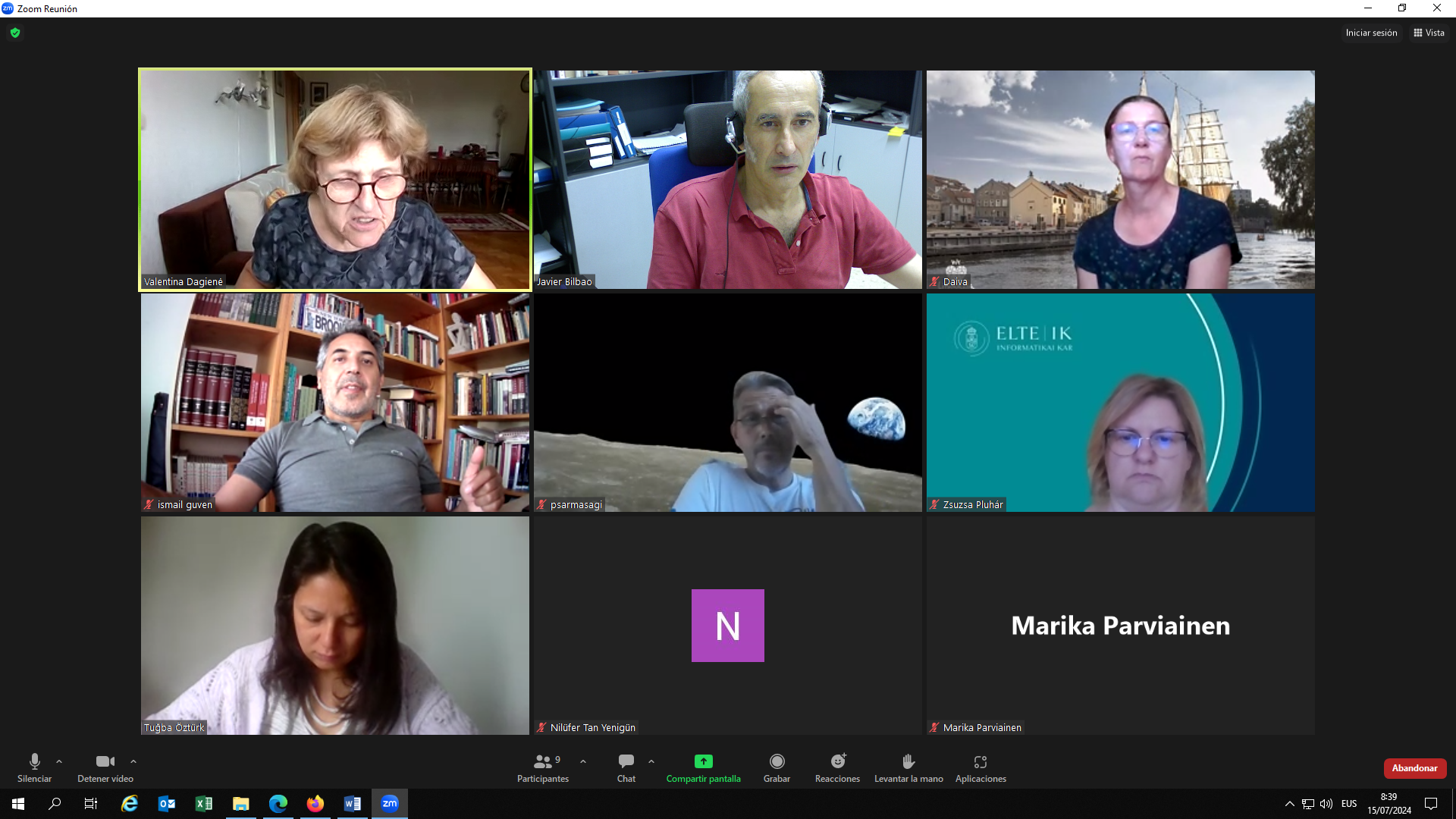
15 July, 2024
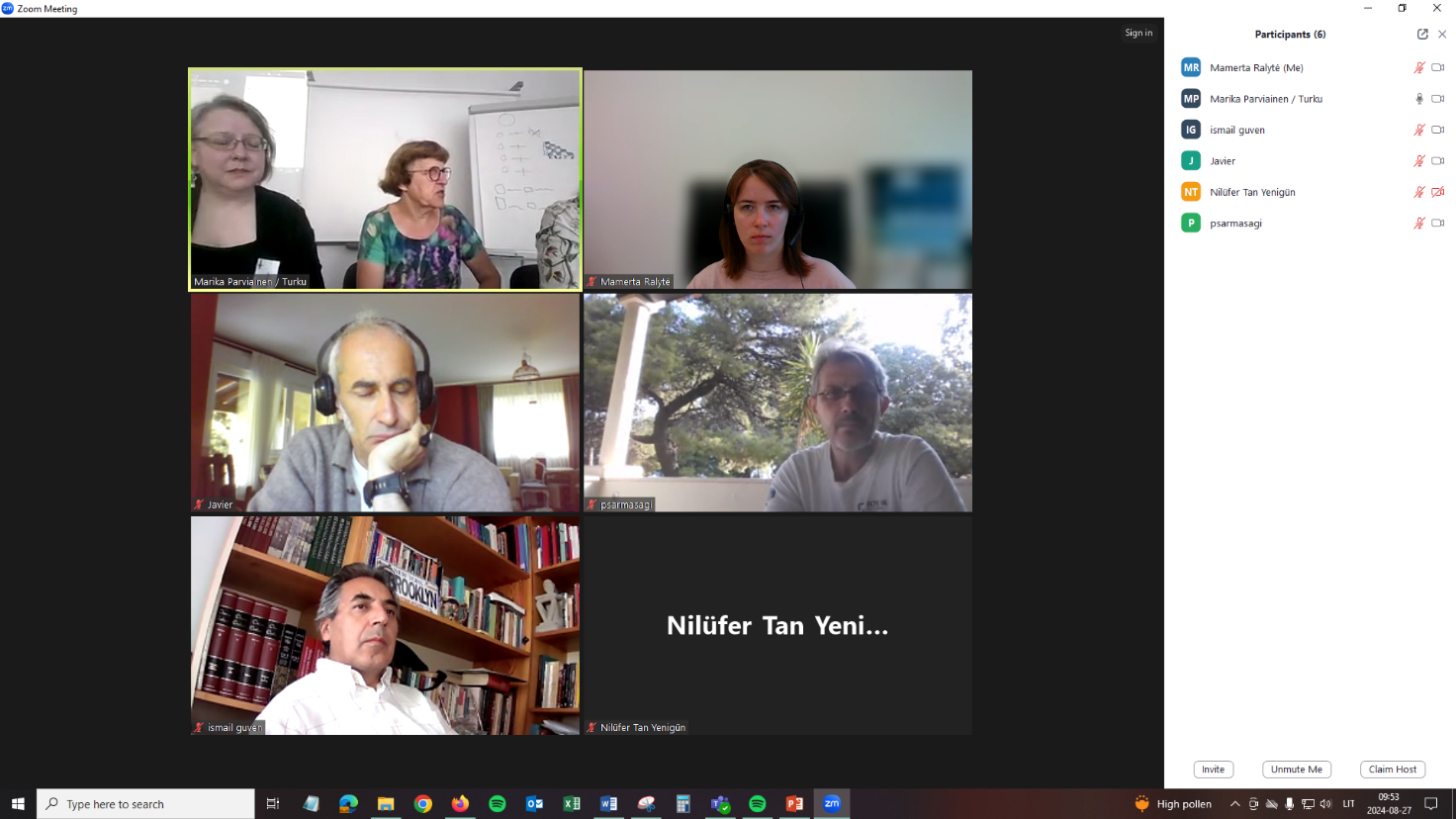
27 August, 2024
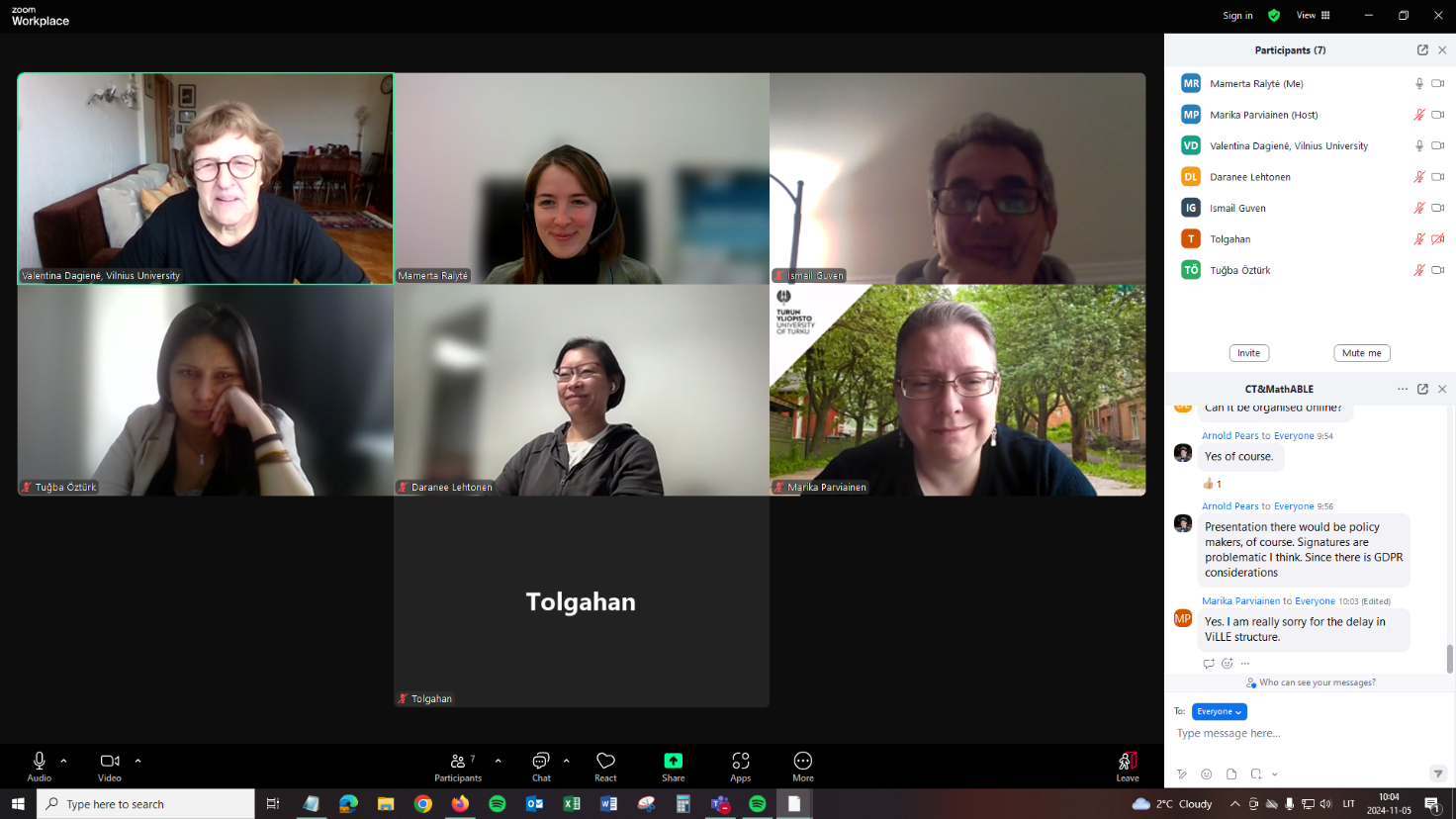
5 November, 2024
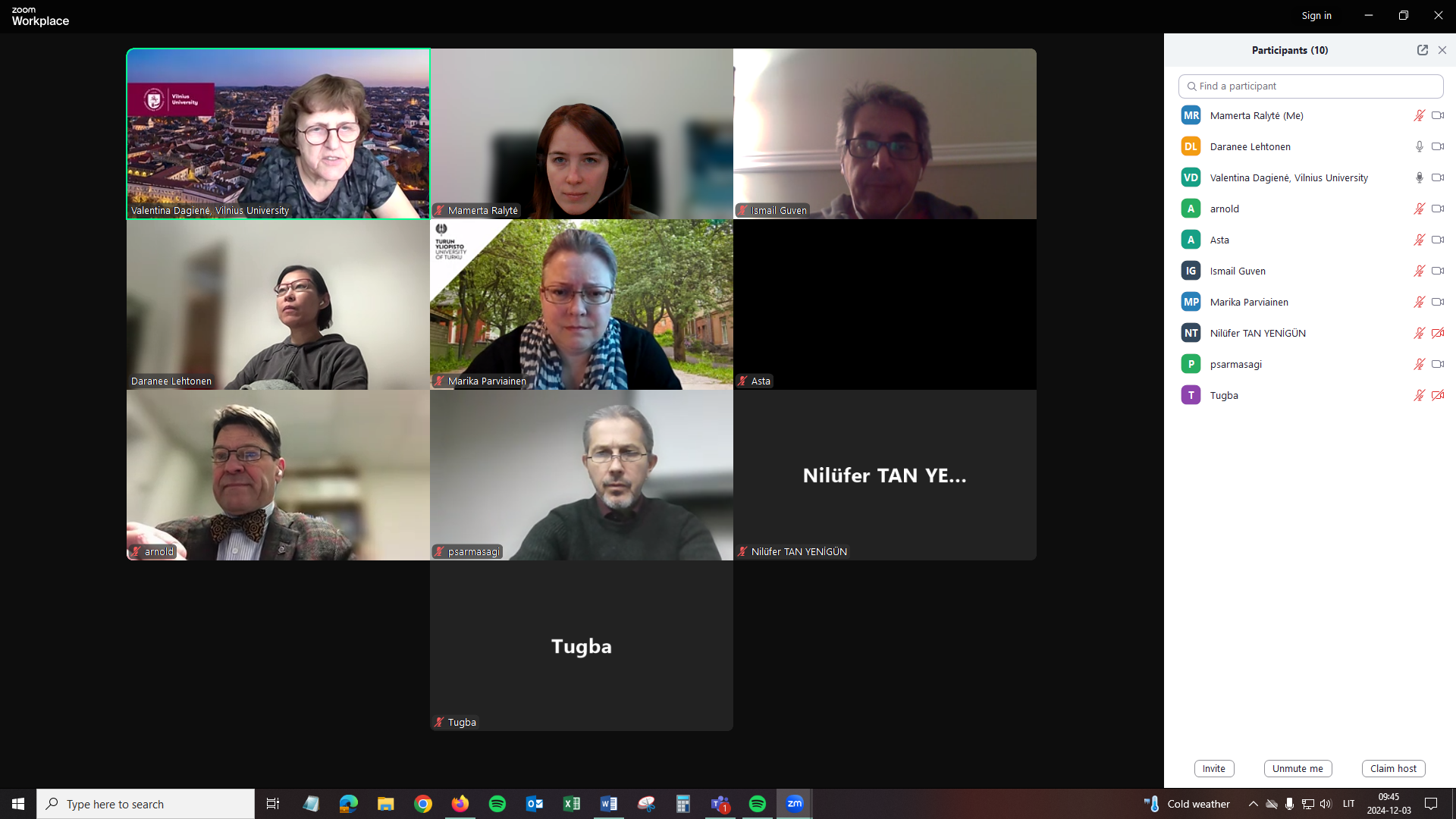
3 December, 2024
January 14, 2025
February 11, 2025
March 18, 2025
April 15, 2025
May 6, 2025
August 19, 2025
Learning Paths for CT with integrated AT
Learning paths provide a structured way to guide students through progressively more complex concepts and skills. They typically consist of three primary components: clearly defined goals, developmental progressions of students’ thinking processes, and instructional activities that promote growth along these progressions. When used to guide lesson development, learning paths ensure continuity: each lesson builds deliberately on prior knowledge, avoiding gaps and supporting steady advancement toward more sophisticated levels of understanding.
In CT&MathABLE, the learning paths were designed to integrate Computational Thinking (CT) with Algebraic Thinking (AT), recognizing that both domains share cognitive processes such as abstraction, decomposition, generalization, and problem solving. For example, a digital competency lesson on sequencing is not treated in isolation but is linked directly to mathematical reasoning about order, operations, or algebraic expressions. This integration allows students not only to develop digital and computational skills but also to deepen their understanding of mathematics through meaningful connections.
To achieve this, the project team designed tasks and activities that simultaneously target CT processes, algebraic concepts, and broader digital competencies. The result is a coherent framework of learning paths that can guide teachers in building lessons step by step, ensuring progression in both computational and mathematical reasoning.
The main results of developing these learning paths include:
- Learning outcomes for three age groups (9–10, 11-12, and 13–14), defining what students should know and be able to do, and serving as a basis for assessment and evaluation.
- Activity plans, created from these outcomes and paired with Bebras tasks, including both online interactive activities and unplugged activities for flexible classroom use.
- Tasks on CT with integrated AT, over 100 practical and current activities designed for integration into an analytics-based learning ecosystem linked with an assessment framework.
- Supporting materials, such as feedback forms, pilot questionnaires, and teacher guides, were translated into all partner languages to ensure accessibility.
- Piloting in schools, where feedback from students and teachers was systematically collected to refine and validate the activities.
- A Teacher Workshop in Budapest, which brought over 100 teachers together to review, discuss, and finalize the learning activities before broad implementation.
Through this structured and collaborative approach, CT&MathABLE has created a robust set of learning paths that combine the strengths of CT and AT, equipping students with essential 21st-century problem-solving skills while supporting teachers with clear, curriculum-aligned guidance.
- Learning outcomes
- Learning Paths (The Activity Plan)
- Learning Activities (Tasks on CT with integrated AT)
- Translated Learning Activities
- Upgrade learning activities
- Teacher workshop
Learning outcomes
In CT&MathABLE, Computational Thinking (CT) is defined as a combination of higher-order skills such as decomposition, algorithmic thinking, hypothesis testing and debugging, and abstraction. Algebraic Thinking (AT) is viewed as a multidimensional construct encompassing categorization, classification, problem-solving, comparison, equations, operations, patterns, functions, statistics, and probabilities.
To develop learning outcomes, the project team reviewed research and created a classification of AT skills and competencies. This framework was then used to annotate and compare the curricula of six European countries. While curricula varied in structure, content, and sequencing, consolidation allowed us to capture common learning progressions and reduce duplication.
The analysis revealed a strong cross-national correlation: over 47% of learning outcomes were common to at least four countries, and more than 80% to three. At the same time, each country emphasized different areas—for example, Spain prioritized problem-solving and patterns, Finland equations and operations, Hungary sorting and equations, Lithuania measurements, Sweden ratios, and Turkey measurements and equations.
The key outcome of this work was the identification of topic areas and shared progressions that form the basis of the CT&MathABLE learning paths, ensuring that they are both research-informed and adaptable to diverse national contexts.
Learning Paths (The Activity Plan)
The concept of learning paths in CT&MathABLE refers to structured progressions that integrate Computational Thinking (CT) with Algebraic Thinking (AT) in mathematics education. These paths outline goals, the developmental progression of students’ cognitive skills, and the instructional activities that enable learners to advance step by step. The emphasis is on creating a coherent sequence where each activity builds on the previous one, allowing students to strengthen their understanding of mathematical concepts while simultaneously developing CT competencies such as decomposition, abstraction, algorithmic thinking, and data handling.
In practice, this means that students engage in tasks where computational strategies directly support mathematical reasoning. For example, learners might be asked to analyze data sets, create algorithms to model mathematical processes, or use abstraction to represent mathematical structures. Activities are designed to encourage problem-solving, iterative testing, and debugging, helping students to connect digital practices with core mathematical ideas.
To ensure that these pathways are pedagogically meaningful and aligned with learning objectives, the project team developed a detailed cross-table linking CT categories with AT learning outcomes. This framework enabled the design of activities that balance mathematical depth with computational processes. The resulting structure includes a comprehensive set of more than 360 categorized elements, forming the foundation for the learning paths that guide instruction for the three target age groups (9–10, 11-12, and 13–14).
By combining computational and algebraic thinking in this way, the learning paths provide teachers with a clear roadmap to introduce concepts gradually, monitor student progress, and ensure that CT is embedded naturally into mathematics education.
Learning Activities (Tasks on CT with integrated AT)
The report Prepare and Integrate Learning Activities focused on consolidating national curricula and developing tasks to support the CT&MathABLE learning paths. A comparative analysis of six countries’ mathematics curricula was conducted, using both statistical and content-based methods. Differences were identified in the number of curriculum entries (from 39 in Lithuania to 141 in Finland), coverage of categories (Turkey in 18, Hungary in 30), and distribution of topics across categories. Despite these differences, the analyses confirmed that national curricula are consistent with EU digital competence goals. At the same time, programming and algorithmization were found to be more strongly emphasized at national levels than in EU directives, reflecting historical developments in informatics education.
From this analysis, 31 major topic areas were defined, covering the core components of Algebraic Thinking (AT) across grade levels. Within these areas, 231 detailed learning outcomes were extracted from national curricula and grouped by age range (grades 3–4, 5–6, and 7–8). These learning activities served as the foundation for designing tasks that directly support the development of AT competencies, integrated with CT processes.
Based on this framework, the project team prepared and collected 387 tasks, which were then mapped into the learning paths, resulting in 437 assignments aligned with specific learning outcomes. These tasks provide a comprehensive and structured resource base for practicing AT components, ensuring strong curricular alignment and supporting integration into the CT&MathABLE learning ecosystem.
Download the file with Prepare and integrate learning activities
Translated Learning Activities
Integrating algebraic and computational thinking provides students with a holistic understanding of mathematics, enabling them to apply algebraic concepts to programming and data analysis while strengthening logical reasoning and problem-solving skills. To ensure these learning activities were usable across all consortium countries, a major effort was made to translate materials from English into Finnish, Hungarian, Lithuanian, Spanish, Basque, Catalan, Swedish, and Turkish.
Task selection for the pilots was done collaboratively by all partners to guarantee relevance to project goals, suitability for the target age groups, and alignment with identified CT and AT competencies. The Finnish partner played a central role in preparing the task environment: recording the English versions of tasks in the ViLLE learning platform, formatting instructions, and organizing teacher support materials. ViLLE, developed at the University of Turku, provided a flexible digital learning environment with strong analytics, allowing tasks to be interactive and teachers to monitor student progress effectively.
Once finalized, all English materials were translated by the national partners into their respective languages, ensuring clarity, accessibility, and consistency across classrooms. This process enabled successful pilot implementation and allowed teachers and students to engage with the activities in their native language while preserving the original pedagogical intentions.
Download the file with Translate and integrate learning activities
Upgrade learning activities
The piloting phase was a crucial step in testing and refining the CT&MathABLE learning activities to ensure their relevance, efficiency, and adaptability across different educational contexts. Conducted from April 1 to May 31, 2025, the pilot aimed to validate the prepared tasks and learning paths by collecting direct feedback from students and teachers in all partner countries.
For each age group (9–10, 11-12, and 13–14), partners selected a set of 20 unplugged activities and 15 online tasks from a pool of 400 prepared tasks. While a guideline recommended 16 online and 4 unplugged tasks per group, each country adapted the selection to its national curriculum and local grade levels. Before the pilot, partners received task packages in English for translation into local languages, ensuring accessibility and alignment with national contexts.
The piloting was organized through demo courses on the ViLLE platform, allowing anonymous access for students and teachers. This approach made it possible to focus exclusively on evaluating task content without collecting personal data. Courses were tailored for each country, and demo links were distributed to teachers to share with their students.
Participation exceeded initial targets: instead of the minimum 20 students per age group per country, hundreds of learners engaged in the pilot. For example, Lithuania involved 725 students, Hungary 170, and Türkiye 62, alongside teacher reviews in Finland and Sweden. Spain piloted tasks with 35 students participating in the Basque group.
Download the file with Upgrade and refine learning activities based on the results of pilots
Teacher workshop
The Teacher Workshop in Budapest was an important milestone, designed to present interim results of the CT&MathABLE project to Hungarian teachers and collect their feedback. The event showcased the developing system, demonstrated how it could be used in classrooms, and allowed participants to test tasks directly in the ViLLE learning environment. Presentations explained the project’s structure and highlighted its pedagogical potential.
During the workshop, teachers tried a demo set of tasks in ViLLE, which illustrated the diversity of interactive activities and their integration into the learning paths. Their feedback provided valuable input for refining both the tasks and the overall system, ensuring that project outcomes remain relevant and practical for classroom use.
Download the file with Teacher workshop with partners in Budapest
Assessment Instruments for CT and AT
To teach the 21st century skills of Computational Thinking (CT) and Algebraic Thinking (AT) by integrating them is unique. As CT and AT share some subskills, intertwining them should benefit the development of both CT and AT. Thus the shared subskills of CT and AT, most importantly algorithmic thinking and problem-solving skills, will be utilized whilst developing the assessment instruments for CT&MathABLE. There is currently a lack of assessment instruments for CT integrated with AT, but teachers certainly need instruments to assess their students’ learning progression and to discover whether additional support is needed.
Two valid and reliable assessment instruments of CT and AT for use with students from age 9 until age 11 will be developed: (COMATH1) and from age 12 until 14 (COMATH2). The need for two separate assessment instruments arises from the
different development phases of the students. The students of the first age group are in the early phase of learning CT and AT whereas the second age group has progressed to more advanced content.
The main results of Work Package 3:
- Based on the definition of learning outcomes of CT (WP2) and the systematic review, assessment instruments for CT and AT skills, COMATH1 and COMATH2, for two different age groups will be developed. COMATH1 and COMATH2 will be of high validity and reliability as they are theoretically grounded and guided by well-established design frameworks, thus fully unravelling the complexities of students’ digital skill development and capturing the level of students’ CT and AT thinking skills.
- Short and clear guidelines for teachers on how to use the assessment instruments. Teachers need them to ensure the correct use of the assessment instrument for 9-11 and 12-14-year-olds.
- Short and clear guidelines for teachers on how to interpret the results of students’ performance.
- The guidelines for teachers will be developed in English and then translated into partner’s languages.
- Review of existing CT and AT Assessment Instruments
- Development of the COMATH
- Piloting#1 and feedback
- Workshop in Bodrum/Mugla
- Updated COMATH
- Piloting#2 and feedback
- Guidelines for teachers
- Assessment Instruments
Review of existing CT and AT Assessment Instruments
A systematic literature review of existing Computational Thinking (CT) and Algebraic Thinking (AT) assessment instruments was carried out to provide a clear overview of the current landscape of tools used in schools. The review aimed to support teachers in selecting suitable instruments for assessing students’ CT and AT skills, to guide researchers in choosing appropriate measures for their studies, and to assist test developers in designing new instruments.
The process involved formulating focused research questions, identifying relevant databases and search terms, and consulting experts to ensure comprehensive coverage. The review examined which instruments have been used to assess CT and AT in primary and lower secondary education, and what psychometric properties have been reported for them. Special attention was given to the reliability, validity, and overall usability of the instruments, as well as to the extent they addressed key subskills such as problem solving, abstraction, and algorithmic thinking.
The results provide a concise overview of existing instruments, their strengths and limitations, and the degree to which they meet the needs of different users. This knowledge forms a practical foundation for the further development and application of CT and AT assessments in education.
Download the file with Review of existing CT and AT assessment instruments
Development of the COMATH
This report presents the initial development of COMATH, an assessment instrument designed to evaluate students’ Computational Thinking (CT) and Algebraic Thinking (AT) skills in the age range of 9–14 years. To reflect different stages of cognitive and skill development, the instrument was structured for three distinct age groups: COMATH1 (ages 9–10), COMATH2 (ages 11–12), and COMATH3 (ages 13–14). Each instrument was therefore designed to reflect these varying levels of complexity and to measure students’ abilities with accuracy and sensitivity.
The process was theoretically grounded in established design frameworks, informed by international experts from multiple disciplines, and supported by feedback from teachers working with the target age groups. Both quantitative and qualitative approaches guided the design to ensure robustness and cross-cultural applicability. The COMATH instruments were built on a classification system derived from national curricula, a systematic review of existing assessment tools, and empirical evaluation data. This foundation ensures that the assessments are not only valid and reliable but also adaptable across different educational contexts.
Piloting#1 and feedback
This report presents the results of the COMATH Pilot 1 study (autumn 2023–spring 2024), which tested the COMATH assessment tool for computational and algebraic thinking in students aged 9–14. Conducted across six partner countries—Finland, Hungary, Lithuania, Sweden, Spain, and Türkiye —the study collected feedback from teachers and students to evaluate the effectiveness of the test items across different ages and educational contexts. The findings were then used to inform refinements to COMATH ahead of the full pilot in autumn 2024, ensuring the instrument’s reliability and suitability for assessing these critical skills.
Workshop in Bodrum/Mugla
The CT&MathABLE project partners gathered in Bodrum, Turkey, from April 22–26, 2024, for a transnational meeting and teacher workshop. The event brought together partners from Lithuania, Hungary, Sweden, Spain, Finland, and Turkey. The meeting focused on advancing the dissemination of computational thinking (CT) through teacher training and on shaping a learning path that connects CT with Algebraic Thinking (AT). As part of the program, workshops were hosted at two Bodrum schools: BİLSEM (April 24 and 26) and TED Bodrum (April 25). Teachers welcomed the opportunity to explore the role of CT in education, to discover the potential of COMATH tests for identifying gifted learners, and to share ideas and experiences with colleagues from across Europe. The exchange of knowledge and practices was highly valued, strengthening both the project’s goals and the professional community around it.
Updated COMATH
This report outlines the further development of COMATH, an assessment instrument for evaluating Computational Thinking (CT) and Algebraic Thinking (AT) skills in students aged 9–14. Building on the outcomes of the first pilot conducted in six partner countries (Finland, Hungary, Lithuania, Türkiye, Sweden, and Spain), the focus was on refining the instruments to improve their validity, reliability, and classroom usability. Feedback was collected through student performance data, surveys, and teacher and student interviews. These insights guided targeted modifications to test items and structure, with the aim of ensuring that the assessments not only measure CT and AT skills effectively across age groups and contexts, but can also be completed within a single lesson. The revised instruments were tested in a second pilot.
Download a summary report of further development of COMATH based on feedback
Piloting#2 and feedback
This report presents the results of the COMATH Pilot 2 study, conducted from autumn 2024 to spring 2025. The study examined the validity and reliability of the COMATH assessment tool, which measures computational and algebraic thinking in students aged 9 to 14. It was carried out across six partner countries: Finland, Hungary, Lithuania, Sweden, Spain, and Türkiye. The evaluation focused on how effectively COMATH assesses these skills across different age groups. The findings from this study contributed to final refinements of COMATH before its release as an open-access assessment instrument.
Guidelines for teachers
The COMATH Teacher Guidelines help teachers, school administrators, and researchers administer and interpret the COMATH assessment, which measures Computational Thinking (CT) and Algebraic Thinking (AT) skills in students aged 9–14. There are three levels: COMATH 1, 2, and 3 for children aged 9–10, 11–12, and 13–14, respectively.
The assessment instrument COMATH was developed by the Turku Research Institute for Learning Analytics, University of Turku, in collaboration with the project partners. COMATH draws on educational theories and curriculum standards from six countries and was reviewed by researchers, teacher educators, teachers, and students. Its validity has been confirmed through large-scale pilot studies involving more than 6,400 students and over 200 teachers.
COMATH guidelines for teachers. EN
COMATH gairės mokytojams. LT
COMATH guidelines for teachers. ES
COMATH guidelines for teachers. EUS
COMATH guidelines for teachers. TR
Assessment Instruments
Computational Thinking and Algebraic Thinking instruments COMATH
Before downloading these instruments, please read the text below.
This educational resource is made available under the Creative Commons Attribution-ShareAlike 4.0 International License (CC BY-SA 4.0). By accessing, using, or distributing this material, you agree to the following terms and conditions:
1. User Registration
Before downloading the COMATH assessment, please complete the following information. Your responses will help us understand the profile of users and improve the resources we provide. Please fill in the form.
2. Permitted Uses
You are free to:
• Share: copy and redistribute the material in any medium or format
• Adapt: remix, transform, and build upon the material for any purpose, even commercially
• Under the following conditions:
A. Attribution
You must give appropriate credit to the original authors, provide a link to the license, and indicate if changes were made. A recommended citation “This resource was created by [Author or Institution Name], licensed under CC BY-SA 4.0. Available at: [link to the resource].”
B. ShareAlike
If you remix, transform, or build upon the material, you must distribute your contributions under the same license as the original (CC BY-SA 4.0).
3. Use of Tests and Assessments
All tests, tasks, and assessment tools included in this resource must be used as a complete set, as originally provided. It is not permitted to:
• Modify the order or content of items without clearly indicating the changes
• Use parts of the test for purposes other than educational or research use without explicit permission
4. Best Practices
• Always credit the original authors and source.
• Do not use the resource for discriminatory, non-educational commercial, or unethical purposes.
• If you adapt the resource, consider sharing your version with the educational community under the same license.
After the form is submitted, COMATH files are available to download.
Developing Interactive Tasks
The goal of Work Package 4 is to develop a set of interactive task and design/program a tool for creation interactive tasks for the CT integrated with AT skills development. The created interactive tasks and tool will be integrated into the ecosystem with
learning analytics.
The main results of Work Package 4:
- A set of classified interactive tasks according to the concepts of computer science / CT integrated with AT;
- A framework of interactive tasks - it can serve for creating new interactive tasks on CT;
- A tool for creating interactive tasks will be designed and programmed, additionally templates for type of interactivity, criteria for interactive tasks, etc. will be developed. All classified tasks would be presented using the tool and the ability to create new tasks will be provided (templates for type of interactivity, criteria for creating interactive tasks)
- A set of interactive tasks for implementation using the developed tool will be created. This set will be piloted in partner schools as well as in the project associated schools and feedback how to improve will be collected;
- The integration of the tool into an analytics based learning ecosystem. Also functionality for the students to solve those interactive tasks will be implemented in the learning ecosystem together with the tool.
- Translation of the created interactive tasks and organizing workshop held in Klaipeda Gedminai Progymnasium for piloting the interactive tasks and tool.
- Research on the usability of the learning tasks. Through observing user experience based on evidence, interaction design will be improved throughout the tasks.
- Classification of interactive tasks
- Framework of interactive tasks
- Tool for creating interactive tasks
- Creating a set of interactive tasks
- Integration tasks into ecosystem
- Transnational meeting and Workshop#2
- Conducting research (an article)
Classification of interactive tasks
As part of the CT&MathABLE project, 200 tasks were selected from the international Bebras repository and organized to create a structured foundation for developing new interactive tasks that integrate Computational Thinking (CT) and Algebraic Thinking (AT). Each year, the Bebras community generates 200 to 300 tasks that cover essential concepts in informatics and CT. These tasks are maintained in a central repository and shared under a Creative Commons license, making them widely available for educational use around the world.
To classify the tasks, a multidimensional framework was used. The analysis considered several dimensions, including key CT concepts (such as abstraction, decomposition, algorithmic thinking, and pattern recognition) and integrated elements of AT (like generalization and symbolic representation). Additionally, tasks were categorized by type, interaction model (e.g., drag-and-drop, simulation), and cognitive demand according to Bloom’s Taxonomy. They were also aligned with two age groups (9–11 and 12–14 years) to ensure they are developmentally appropriate.
At least three experts from the project consortium reviewed and classified each task to ensure both reliability and pedagogical quality. The classification process also assessed the interactivity and user interface design, taking into account each task’s suitability for integration into an analytics-enabled digital learning environment.
This initiative has resulted in a coherent taxonomy that supports the design of engaging and educational interactive tasks. It aligns with curriculum goals, accommodates diverse learners, and fosters future research, task development, and learning analytics.
Framework of interactive tasks
The Framework of Interactive Tasks provides a structured, research-based approach for designing effective and engaging digital tasks that integrate Computational Thinking (CT) and Algebraic Thinking (AT). Developed collaboratively by Vilnius University, Ankara University, and the University of the Basque Country, this framework served as the foundational guide for creating 100 high-quality interactive tasks used in the project's learning ecosystem.
The framework is based on Mayer’s Multimedia Design Principles, including Coherence, Signaling, Modality, Segmenting, and Personalization. These principles are designed to optimize cognitive load and enhance student learning. Additionally, the framework incorporates Bloom’s Revised Taxonomy to ensure a broad range of cognitive complexity, from basic understanding to advanced problem-solving.
The framework features a CT skill matrix that aligns tasks with essential competencies such as abstraction, algorithmic thinking, pattern recognition, and decomposition, while integrating them with algebraic concepts like expressions and symbolic reasoning. Templates and rubrics were developed to guide task creation, ensuring both consistency and pedagogical effectiveness.
This framework was not only used to produce the 100 interactive tasks but was also presented and reviewed during the Workshop in Klaipėda Gedminai Progymnasium, where teachers validated its practical usefulness and its impact on student engagement. The systematic approach guarantees the framework's long-term value and scalability for future task development across various educational contexts.
Tool for creating interactive tasks
Bebras Lodge is a digital tool designed to simplify and enhance the creation of interactive learning tasks. Building on the pedagogical tradition of the internationally recognized Bebras Challenge, it provides a platform for teachers and students to develop tasks using both intuitive templates and programming, allowing for greater customization and creativity.
The tool addresses a noticeable gap in the current landscape of educational technologies. While commercial systems often offer powerful features at the expense of complexity and high licensing fees, and free tools like LearningApps provide simplicity but with limited flexibility, Bebras Lodge strikes a balance between accessibility and depth. It empowers teachers to design, adapt, and share high-quality tasks without requiring advanced technical skills. Additionally, it encourages students to participate in task creation, fostering collaboration and creativity.
Bebras tasks are visually engaging, interactive, and pedagogically sound. They can be integrated into virtual learning environments and connected with assessment systems, supporting diverse teaching and learning contexts. By promoting hands-on creation and active participation, the tool facilitates the development of computational thinking, logical reasoning, and problem-solving skills that extend well beyond computer science.
Bebras Lodge represents a scalable and innovative solution for modern education. It lowers barriers to task creation, enhances student motivation through interactivity and gamification, and contributes to a more dynamic, engaging, and student-centered approach to teaching and learning.
To start using Bebras Lodge, create an account on the official website: https://bebras-lodge.sp.fsf.vu.lt/
For more detailed guidance, you can download the user instructions.
Creating a set of interactive tasks
A set of 100 interactive tasks was created to integrate Computational Thinking (CT) and Algebraic Thinking (AT) into engaging, student-centred learning experiences. The development and implementation of an interactive task framework reflects the project’s emphasis on gamification and interactivity, both of which are proven to significantly enhance student motivation. Since motivated learners consistently achieve better outcomes, game-based learning represents a key element of the overall pedagogical approach.
The tasks were inspired by the international Bebras Challenge, a widely recognised initiative in informatics and computational thinking education. Following the style of Bebras-like problems, they incorporate minimal text, visually appealing elements, and interactive features that mirror the simplicity and attraction of computer games. This design makes the tasks highly accessible to learners while maintaining cognitive depth and supporting higher-order thinking. By blending the familiarity of gamified formats with curricular goals, the tasks effectively bridge the gap between traditional instruction and game-based learning.
The 100 tasks were piloted in schools, where student engagement and teacher feedback confirmed their effectiveness in fostering motivation, critical thinking, and active participation. Insights from these pilots informed further refinements, ensuring that the framework is both scalable and adaptable to diverse educational contexts, languages, and curricula.
Through these efforts, a sustainable model has been established for developing interactive learning activities that can be expanded with new content, adapted for different age groups, and disseminated widely, thereby promoting innovative, motivating, and accessible CT and AT skill development.
Download the file with Creating a set of interactive tasks and pilot
Integration tasks into ecosystem
A set of 100 interactive tasks has been developed and integrated into a learning ecosystem connected with an assessment framework. This integration ensures accessibility for students and enables the collection of learning data, as each task communicates with the learning management system through an API that records scores automatically and supports streamlined analysis.
The tasks were inspired by Bebras-like challenges and designed with visually engaging elements, minimal text, and dynamic interactivity, mirroring the simplicity and appeal of computer games. This gamified approach fosters motivation and active participation, which research consistently links to improved learning outcomes. By building on the global recognition of the Bebras Challenge, the tasks provide students with a familiar yet stimulating environment that encourages problem-solving and critical thinking.
The tasks were piloted in schools, where feedback from teachers and students informed further refinements. This process ensures that the framework is not only effective and engaging but also scalable and adaptable across different educational contexts, age groups, and curricula. The result is a sustainable model for interactive and student-centred learning that bridges traditional teaching with gamified education.
Transnational meeting and Workshop#2
The transnational meeting and Workshop #2, held from September 28 to October 2, 2024, at Klaipėda Gedminai Progymnasium in Lithuania, marked a pivotal moment in evaluating and refining the project’s interactive tasks for Computational Thinking (CT) and Algebraic Thinking (AT). Representatives from all partner countries—including university experts and school practitioners—gathered to observe classroom implementation, analyze Learning Analytics, and collaboratively plan improvements.
During the workshop, over 100 interactive tasks were successfully piloted with students aged 9–14 using the ViLLE learning platform. These tasks spanned a variety of CT and AT concepts and demonstrated high usability, age-appropriateness, and strong student engagement—even among younger pupils. Teachers and researchers observed real-time classroom sessions, collected feedback, and reviewed detailed learning analytics, including time-on-task, completion rates, and difficulty indicators.
A key outcome was the identification and refinement of tasks based on both observation and data. Tasks were adjusted for clarity, complexity, and interactivity, ensuring better alignment with learners’ needs. An important innovation discussed was dual-level parametrization, allowing for personalized task instances and scalable adaptation across different grade levels.
ViLLE’s gamified features and real-time analytics supported both motivation and differentiated instruction. Students were encouraged to take ownership of their learning by choosing tasks and earning virtual rewards, while teachers could monitor progress and offer targeted support.
The in-person format of the Klaipėda meeting enhanced collaboration among partners, enabling deep pedagogical discussions, alignment on next steps, and stronger community ties. Workshop #2 confirmed that the interactive tasks are not only technically functional but also pedagogically robust, forming a solid foundation for the broader integration of CT and AT in European classrooms.
Conducting research (an article)
The CT&MathABLE project team conducted a comprehensive usability study of its interactive tasks, leading to the publication of a peer-reviewed article titled “Evaluating Interactive Tasks through the Lens of Computational and Algebraic Thinking, Interactivity Types, and Multimedia Design Principles” in “Olympiads in Informatics”, Vol. 19, 2025 (DOI: 10.15388/ioi.2025.05). This paper, authored by researchers from six partner institutions, was also presented at the IOI Conference in Sucre, Bolivia, in July 2025 (https://ioi2025.bo/ioi-conference).
The research involved 207 student participants and examined how different types of interactivity and multimedia design impact engagement and learning outcomes in Computational Thinking (CT) and Algebraic Thinking (AT) tasks. Important factors assessed included task completion times, student performance, types of interactivity (such as drag-and-drop and click-on-object), and the application of Mayer’s multimedia design principles, which encompass aspects like contiguity, signaling, and coherence.
The findings revealed that dynamic interactivity significantly enhanced student engagement and facilitated iterative learning. Over 94% of the tasks adhered to key multimedia design principles, and statistically significant correlations were identified between design quality and learning outcomes. The study confirmed that CT&MathABLE tasks are not only pedagogically sound and cognitively effective but also designed for high usability.
This evidence-based validation highlights the project's academic value while offering practical guidance for the development of future tasks. The research supports the scalability of the project and reinforces its contribution to innovative, data-driven learning in computational and algebraic thinking.
Quality Assurance
The Quality Assurance Plan (QAP) is developed in compliance with the Project CT&MathABLE description and all applicable rules and guidelines.
Quality Assurance measures in a project ensure the quality of the project results and the quality of the methods and procedures used to manage the project lifecycle and to develop these results. The QAP defines the specific measures to be followed by the project partnership to ensure the effective management of the project and the conformity of Project deliverables with the expectations and objectives of the project.
The Quality Assurance Plan outlines the indicators, methodology and procedures for evaluation of project activities and results. It contains a set of scheduled activities and defines the objectives, roles and responsibilities. It is a primary concern that the approach to evaluation and review should be simple, flexible, relatively easy to implement, and certainly improvement oriented.
In this research project, partners will be able to avoid the possible distraction of the complexities of the technology by combining unplugged and plugged-in Computational Thinking (CT) exercises embedded with Algorithmic Thinking (AT) into an analytics based learning framework: CT&MathABLE. In doing so, we are able to offer a novel way to familiarize students with CT and AT with a learning framework which is not that distractive for students as they are familiar with the learning environment already via using it in other school subjects. In addition, in this way we are able to avoid the traditional approach “first-arithmetic-then-algebra”, which does not support the development of students’ AT skills effectively enough. In many countries, early algebra skills are not emphasized which leads to difficulties later when algebra is introduced as a separate topic. According to some authors, teaching Mathematics and Information and Communication Technology, especially in combination with algebra, would benefit the students, but the teaching needs to be carried out in a multifaceted way as will be done within the CT&MathABLE.
CT&MathABLE project aim is to make the benefits of CT skills in mathematics explicit. The focus is especially on early algebra and AT since it shares many traits with computational thinking such as abstraction, generalization, pattern matching and structuring operations. We use the Bebras competition as a model for our intervention. It is hard to change national curriculums, instead we introduce additional activities that can be incorporated into the mathematics lessons by the teacher. These activities are CT problems integrated with AT, and they are fitted to the current mathematical context with an eye on developing both CT and AT in parallel. The problems are structured based on subskills of CT (e.g., data and information, algorithms) and, thus, require the use of selected CT skills embedded with AT for the solution. The correct answer is also provided with an explanation how this problem relates to computer science and AT.
In addition to the learning activities, an assessment tool for CT and AT will be developed, because the teachers need a framework to assess how students CT and AT skills are developing. Using the assessment tool they can plan support activities for a student who needs help in his/her learning.
From the future perspective, making careers requiring mathematical profiles in compulsory schooling more accessible and attractive to young people is a key to enhancing access to STEM careers. Leveraging digital transformative technologies the project provides new approaches to developing algebraic and computational thinking competencies in a way that is individually tailored to the learner. CT&MathABLE achieves this through a novel instructional architecture which supports individualized development paths and seamless integration with competency and assessment frameworks. Direct contribution to education for all, broadened participation and inclusion, the goal is to achieve sustainable quality in education.
Dissemination
- CT&MathABLE Strategic Communication Plan
- News from Partner Countries
- Videos
- Material for printing
- Publications
- Mentioned on media
- LinkedIn Group
News from Partner Countries
ANKU - Ankara University, Türkiye
Eötvös Loránd University, Hungary
KTH - Royal Institute of Technology, Sweden
UPV/EHU - University of the Basque Country, Spain
UTU - University of Turku, Finland
KGP - Klaipėdos Gedminų Progymnasium, Lithuania
MOAS - Mamak Özkent Akbilek School, Türkiye
Videos
100 Interactive Tasks Across 6 Countries
In this video, we describe the current achievements in developing interactive tasks as a learning approach to provide advanced skills in Computational and Algebraic Thinking for years 9-10, 11-12 and 13-14. One hundred tasks have been developed and translated into the local languages of 6 countries in Europe.
Standardised Assessment Instrument
In this video, we describe the current achievements in developing a standardised assessment instrument for Computational and Algebraic Thinking in years 9-10, 11-12 and 13-14. The items have been tested on more than 4000 pupils in 6 countries in Europe.
100 Interactive Tasks Tested at Klaipėda Gedminai Progymnasium
The project has successfully developed 100 interactive tasks focused on various informatics concepts, now fully integrated into the ViLLE platform. These tasks are being tested by students at Klaipėda Gedminai Progymnasium, where both primary and secondary school students actively engage with the innovative learning materials. During project activities, project partners observed lessons at the school, witnessing firsthand the practical application and impact of the developed tasks in a real classroom environment.
Grades 5-6 | Grade 4 | Grades 1-2
CT&MathABLE Publication Update
The EU project CT&MathABLE has published several papers during 2023 as support for policymakers and other professionals working with Computational and Algebraic Thinking in Compulsory Schooling.
Computational and Algebraic Thinking Assessment and Training
Check the video about Work Package 3 — the development of an assessment framework. The assessment framework targets students in the age groups 9 to 10, 11 to 12 and 13 to 14.
It looks at computational thinking and algebraic thinking skills, defining learning objectives and classification systems through a systematic literature review and analysing previous tests of students' capabilities.
Introducing Computational and Algebraic Thinking in Schools with Learning Analytic Support
CT&MathABLE is an innovative ERASMUS+ project developing new learning resources and approaches. The aim is to enhance national competitiveness through enhanced education of school-age children in two key 21st-century skills, computational thinking and algebraic thinking. Join two of our researchers, Professors Arnold Pears and Javier Bilbao, for a quick glimpse of the project and some of its first insights.
An Overview of the CT&MathABLE Project
This introductory video presents the CT&MathABLE initiative—an EU-co-funded project designed to strengthen Computational and Algebraic Thinking in European schools. It outlines the project’s vision: to develop and deploy personalised, interactive learning paths and assessments for students aged 9–14. The video also highlights how CT&MathABLE provides localised learning resources, competency-based frameworks, and a library of interactive tasks supported by learning analytics to empower both students and educators across Europe.
Budapest 30-31 May - 1 June 2023
The 7th face-to-face CT&MathABLE meeting was held on 30-31 May - 1 June 2023 in Eötvös Loránd University, Faculty of Informatics, Budapest. 22 participants were attended from all project partner institutions. Main attention was paid to define the Learning Paths and the curriculum analyses of Algebraic Thinking (WP2), development of the COMATH assessment instruments (WP3), and the framework of the interactive tasks (WP4).
The meeting culminated in a successful Hungarian teachers' workshop with afocus on unplugged activities of Computational Thinking.
Publications
Scientific peer-reviewed journals
✔ Sarmasági, P., Rumbus, A., Bilbao, J., Margitay-Becht, A., Pluhár, Z., Rebollar, C., & Dagiene, V. (2025). Bridging Algebraic and Computational Thinking: Impacts on Student Development in K-12 Education. Informatics in Education, 24(2), 343-376. DOI 10.15388/infedu.2025.13
✔ Gulbahar, Y., Öztüurk, T., Dagiene, V., Parvainen, M., Güven, I., & Bilbao, J. (2025). Evaluating Interactive Tasks through the Lens of Computational and Algebraic Thinking, Interactivity Types, and Multimedia Design Principles. Olympiads in Informatics, Vol. 19, 63–86, DOI: 10.15388/ioi.2025.05
✔ Bilbao, J., Bravo, E., García, O., Rebollar, C., Laakso, M. J., Kaarto, H., ... & Masiulionytė-Dagienė, V. (2025). Analytical Methods and Tools for Evaluating the Development of Computational Thinking Abilities. International Journal of Education and Information Technologies, Vol. 19, 53-61. DOI: 10.46300/9109.2025.19.6
✔ Bilbao Landache, J. J., Bravo Sevilla, E., García Zabalbeitia, M. O., & Rebollar Echevarría, C. (2024). Introducing computational thinking in calculus for engineering. International Journal on Technical and Physical Problems of Engineering (IJTPE), Vol. 15, issue 58, ISSN 2077-3528, 239-246.
✔ Bilbao, J., Bravo, E., Garcia, O., Rebollar, C., Laakso, M. J., Kaarto, H., Lehtonen, D., Parviainen, M., Jankauskienė, A., Pears, A., Güven, I., Gülbahar, Özdemir Öncül, F., Yenigün, N. T., Pluhár, Z., Sarmasági, P., Dagiene, V. & Masiulionyte-Dagiene, V. (2024). Introducing computational thinking and algebraic thinking in the European educational systems. International journal of education and information technologies., Vol. 18, 11-19. DOI: 10.46300/9109.2024.18.2
International conferences
✔ Lehtonen, D., Satomaa, E., Kaarto, H., Parviainen, M., Laakso, M. J., Sarmasági, P., Pluhár, Z., Rumbus, A., Dagienė, V., Masiulionytė-Dagienė, V., Jankauskienė, A., Bilbao, J., Bravo, E., García, O., Rebollar, C., Pears, A., Güven, I., Gülbahar, Y., Öztürk, T. & Yenigün, N. T. (2025). Development and Evaluation an Online Assessment of Computational and Algebraic Thinking: Perspectives of Students and Teachers from Six Countries. In 17th Annual International Conference on Education and New Learning Technologies (EDULEARN), Palma, Mallorca, Spain, June 30-July 2, 2025. EDULEARN25 Proceedings, ISBN: 978-84-09-74218-9 / ISSN: 2340-1079, Publ. IATED (pp. 4570-4578). DOI: 0.21125/edulearn.2025.
✔ Lehtonen, D., Parviainen, M., Kaarto, H., Räsänen, P., & Dagienė, V. (2025). Development of Digital Learning Materials to Promote Computational Thinking in Grades 1–9. In 19th International Technology, Education and Development Conference (INTED2025), Valencia, Spain, 3-5 March 2025, INTED2025 Proceedings, Publ. IATED (pp. 6643-6650). DOI: 10.21125/inted.2025.1720
✔ Bilbao, J., Bravo, E., García, O., Rebollar, C., Dagienė, V., Masiulionytė-Dagienė, V., Jankauskienė, A., Laakso, M.-J., Kaarto, H., Lehtonen, D., Parviainen, M., Güven, I., Gülbahar, Y., Öztürk, T., Yenigün, N. T. Pluhár, Z., Sarmasági, P., Rumbus, A. & Pears, A. (2025). Analytics for the Assessment of Computational Thinking. In 19th International Technology, Education and Development Conference (INTED2025), Valencia, Spain, 3-5 March 2025, INTED2025 Proceedings, Publ. IATED (pp. 6861-6868). DOI: 10.21125/inted.2025.1764
✔ Sarmasági, P., Rumbus, A., Bilbao, J. (2025). Algebraic and Computational Thinking: Foundations for Problem-Solving. In: Illés, Z., Verma, C., Gonçalves, P.J.S., Singh, Y. (eds) Proceedings of International Conference on Recent Innovations in Computing. ICRIC 2024. Lecture Notes in Electrical Engineering, vol 1421. Springer, Singapore. https://doi.org/10.1007/978-981-96-6034-6_6.
✔ Bilbao, J., Bravo, E., García, O., Rebollar, C., Dagienė, V., Masiulionytė-Dagienė, V., Jankauskienė, A., Laakso, M.-J., Kaarto, H., Lehtonen, D., Parviainen, M., Güven, I., Gülbahar, Y., Öztürk, T., Özdemir Öncül, F., Yenigün, N. T., Pluhár, Z., Sarmasági, P. & Pears, A. (2024). Categorization of Computational Thinking. In 17th Annual International Conference of Education, Research and Innovation (ICERI2024), Seville, Spain, 11-13 November, 2024, ICERI2024 Proceedings Publ. IATED (pp. 7466-7473). DOI: 10.21125/iceri.2024.1802
✔ Sarmasági, P., Rumbus, A., Pluhár, Z., & Margitay-Becht, A. (2024, October). Place of "crafts" in the education of Algebraic and Computational Thinking. In: Gaál, Bence; Agócs, Noémi Bernadett (szerk.) . Budapest, Magyarország : ELTE Informatikai Kar (2024) pp. 74-83. https://people.inf.elte.hu/gaalbence/issep2024/ISSEP24_local_final_version#page=83
✔ Kaarto, H., Bilbao, J., Pears, A., Dagienė, V., Kilpi, J., Parviainen, M., Pluhár, Z., Gülbahar, Y. & Laakso, M. J. (2024, October). BeLLE: Detecting National Differences in Computational Thinking and Computer Science Through an International Challenge. In International Conference on Creative Mathematical Sciences Communication (pp. 168-182). Cham: Springer Nature Switzerland. DOI: 10.1007/978-3-031-73257-7_14
✔ Öztürk, T., Güven, İ., & Ayantaş, T. (2024, September). Bibliometric review of computational thinking and mathematical thinking. Conference: Annual Conference of Association for Learning Technology 2024. At: Manchester UK. (Link)
✔ Bilbao, J., Bravo, E., García, O., Rebollar, C., Dagienė, V., Masiulionytė-Dagienė, V., Jankauskienė, A., Laakso, M.-J., Kaarto, H., Lehtonen, D., Parviainen, M., Güven, I., Gülbahar, Y., Öztürk, T., Özdemir Öncül, F., Tan Yenigün, N., Pluhár, Z., Sarmasági, P. & Pears, A. (2024). Computational Thinking and Problem Solving in the PISA era. In 18th International Technology, Education and Development Conference (INTED2024), Valencia, Spain, 4-6 March, 2024, INTED2024 Proceedings, Publ. IATED (pp. 7335-7342). DOI: 10.21125/inted.2024.1922
✔ Bilbao, J., Bravo, E., García, O., Rebollar, C., Dagienė, V., Masiulionytė-Dagienė, V., Jankauskienė, A., Laakso, M.-J., Kaarto, H., Lehtonen, D., Güven, I., Gülbahar, Özdemir Öncül, F., Pluhár, Z., Sarmasági, P. & Pears, A.(2023). Working the basis of computational thinking: Definition and skills. In 16th Annual International Conference of Education, Research and Innovation (ICERI2023), Seville, Spain, 13-15 November, ICERI2023 Proceedings Publ. IATED (pp. 8410-8416). https://library.iated.org/publications/ICERI2023/start/1325 DOI: 10.21125/iceri.2023
✔ Sarmasági, P. (2023). The Necessity of Gaining Computational Thinking. In 16th Annual International Conference of Education, Research and Innovation (ICERI2023), Seville, Spain, 13-15 November, ICERI2023 Proceedings, Publ. IATED (pp. 8923-8931). https://library.iated.org/publications/ICERI2023/start/1425 DOI: 10.21125/iceri.2023.2277
✔ Sarmasági, P., Rumbus, A., Pluhár, Z., & Margitay-Brecht, A. (2023, October). Exploring Computational Thinking Through the Lens of Algebraic Thinking. In: Illés, Z., Verma, C., Gonçalves, P.J.S., Singh, P.K. (eds) Proceedings of International Conference on Recent Innovations in Computing. ICRIC 2023. Lecture Notes in Electrical Engineering, vol 1195. Springer, Singapore. https://doi.org/10.1007/978-981-97-3442-9_6.
✔ Pears, A., Bilbao, J., Dagiené, V., Gulbahar, Y., Margitay-Becht, A., Parviainen, M., Pluhar, Z., Sarmasági, P. Integrating Computational Thinking with Mathematical Problem Solving. 16th International Conference on Informatics in Schools: Situation, Evolution, and Perspectives, ISSEP 2023, Lausanne, Switzerland, October 23–25, 2023, Local Proceedings: https://zenodo.org/records/10015799 https://www.youtube.com/watch?v=5p3_0Cc6ES4
✔ Bilbao, J., Bravo, E., García, O., Rebollar, C., Feniser, C., Dagienė, V., Masiulionytė-Dagienė, V., Laakso, M.-J., Hakkarainen, A., Güven, I., Gülbahar, Y., Pluhár, Z., Sarmasági, P. & Pears, A. (2023). Algebraic thinking and computational thinking in pre-university curriculum. In 17th International Technology, Education and Development Conference (INTED2023), Valencia, Spain, 6-8 March, INTED2023 Proceedings, Publ. IATED (pp. 3888-3895). https://library.iated.org/view/BILBAO2023ALG DOI: 10.21125/inted.2023.1037
Mentioned on media
Poster "Empowering Educators Crafting Computational Thinking Materials and Learning Analytics for Grades 1 to 9", prepared by Marika Parviainen, Heidi Kaarto, and Daranee Lehtonen (Turku Research Institute for Learning Analytics, University of Turku).
LinkedIn Group
Join Our LinkedIn Group and Be Part of the Conversation!
Are you interested in how computational thinking and algebraic skills can transform education? Whether you're a scientist, policymaker, or educator, we’d like to have you join our LinkedIn group for the CT&MathABLE project.
This is a space for sharing ideas, staying updated on the latest project developments, and connecting with others who are passionate about digital transformation in schools. By joining, you’ll get:
- A first look at our innovative tools and resources for teaching computational thinking and algebraic skills.
- Opportunities to collaborate with experts and like-minded professionals.
- A place to share insights and explore ideas about how we can prepare students for the future of work and learning.
We’re excited about the work we’re doing and hope you’ll be part of it. Click here to join the LinkedIn group and let’s start the conversation!
Educational Summit in Stockholm
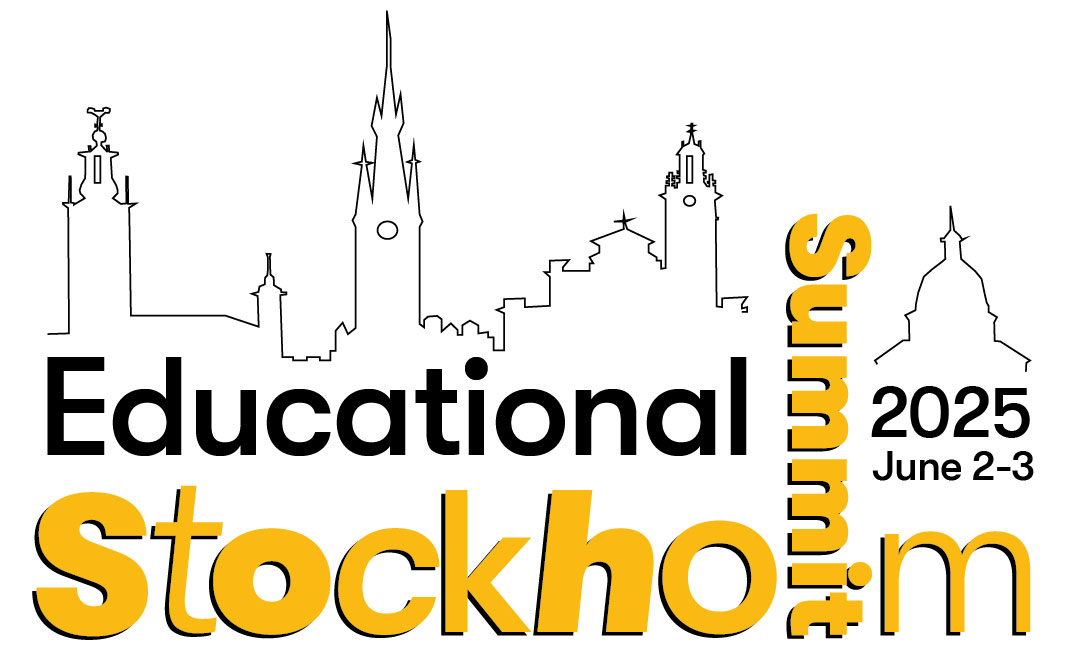
1-st day. Monday, 2 June 2025
Day 1: Educational Organisers and Policy makers
Registration for Educational Summit in Stockholm for the Monday, 2 June 2025
The first-day programme: Click here
2-nd day. Tuesday, 3 June 2025
Day 2: School Leaders, Principals and Headmasters
Registration for Educational Summit in Stockholm for the Tuesday, 3 June 2025
The second-day programme: Click here
Workshops
Workshop in Klaipėda
Workshop in Klaipėda
The project partners had the opportunity to observe lessons at Klaipėda Gedminai Progymnasium, where both primary and secondary school students engaged with the interactive tasks developed for the project.
Workshop #2, Klaipėda, Lithuania, September 28 – October 2, 2004
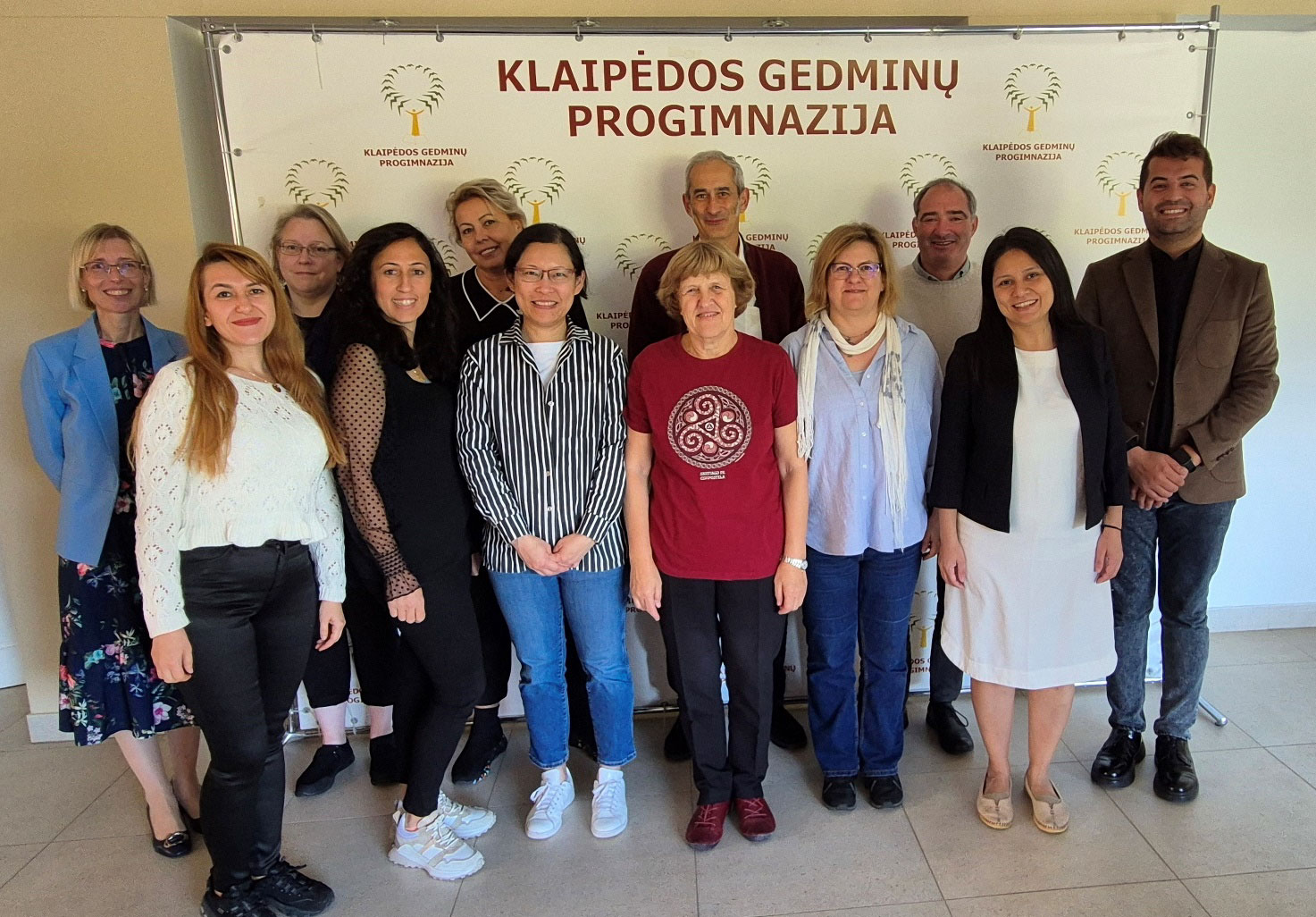
Project Consortium
 |
VILNIAUS UNIVERSITETAS |
|
|
EOTVOS LORAND TUDOMANYEGYETEM Hungary www.elte.hu |
|
|
UNIVERSIDAD DEL PAIS VASCO / EUSKAL HENRIKO UNIBERTSITATEA Spain www.ehu.eus |
|
|
KUNGLIGA TEKNISKA HOEGSKOLAN |
 |
GEDMINŲ PROGIMNAZIJA |
 |
TURUN YLIOPISTO |
 |
ANKARA UNIVERSITESI Türkiye ankara.edu.tr/en/index |
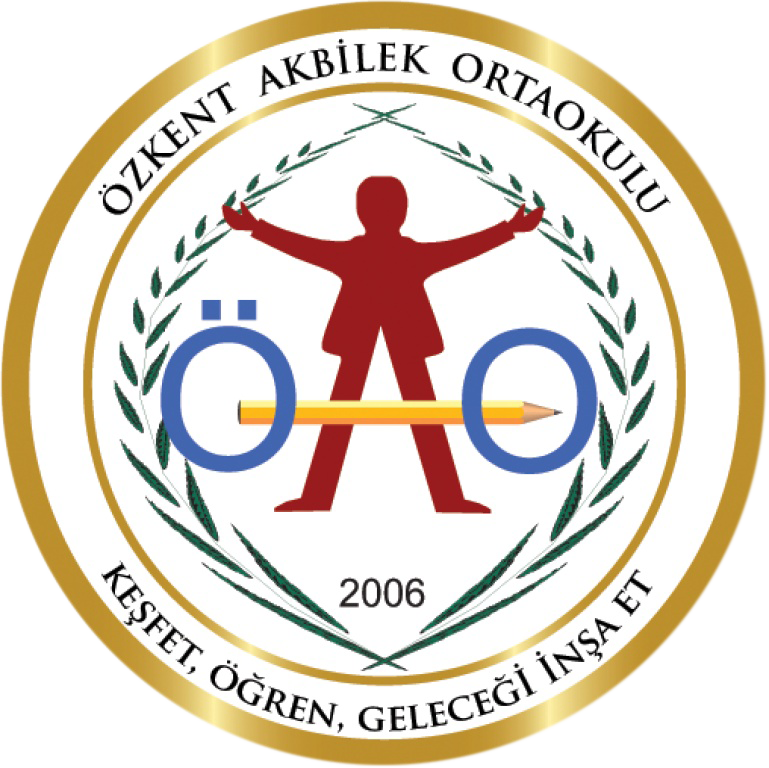 |
OZKENT AKBILEK ORTAOKULU Türkiye ozkentakbilekoo.meb.k12.tr |
![]()
Co-funded by the European Union. Views and opinions expressed are however those of the author(s) only and do not necessarily reflect those of the European Union or the National Agency. Neither the European Union nor National Agency can be held responsible for them.








